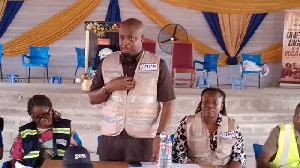Business News of Tuesday, 13 May 2025
Source: www.ghanawebbers.com
Oil projects in Ghana: Mixed feelings as communities cry foul over transparency
For four months, Zainab Abdullah and her neighbors have faced a water crisis. They live near the SSNIT Flats, Fuo, and Taha in Tamale. The taps that were once unreliable are now nearly dry.
They believe the problem stems from the Global Dream Area Road project. This project was completed by Insaan Ghana Limited. Zainab is shocked that no one consulted her community before starting it.
“We asked our assemblyman, but he had no idea,” she told the Ghana News Agency (GNA). Many communities across Ghana share her frustration. Oil-funded projects often spark controversy due to lack of local input.
Ghana began commercial oil production in 2010. The government aims to use oil revenues for infrastructure development. However, a recent study by Local Accountability Networks (LANeTs) reveals transparency issues.
In Asante Akyem, monitors found details on seven oil-funded projects missing at local assemblies. “Contracts were awarded in Accra with little local input,” said Philip Duah from LANeTs. Some projects showed defects while others were abandoned.
In the Volta Region, a supposedly complete project had unfinished washrooms. “These issues indicate mismanagement and poor execution,” an official stated.
Ghana has made efforts for accountability in its extractive sector. The Public Interest and Accountability Committee (PIAC) oversees oil revenue collection and spending independently. Reports from PIAC and the Ghana Extractive Industries Transparency Initiative (GHEITI) provide financial insights.
However, experts argue these measures are insufficient. The GACC is working with LANets to monitor oil-funded projects over the past two years. They document corruption issues and engage with the government for corrections.
Findings from 35 scrutinized projects revealed inefficient spending of oil revenue. “The Government needs independent checks on planning and execution,” said Dr. Steve Manteaw of GHEITI. “Without monitoring, we risk corruption and inefficiencies.”
Looking ahead, Ghana plans to allocate 100% of its Annual Budget Funding Amount (ABFA) from oil revenues to infrastructure by 2025. This is an increase from 70%. While this shows commitment to development, experts warn against repeating past mistakes.
“The new approach is promising, but all projects must be completed,” Dr. Manteaw emphasized. Ghana's experience reflects challenges faced by other oil-rich African nations like Nigeria and Angola.
For Zainab Abdullah and others, solutions include greater transparency and better community engagement in planning processes. “We want roads,” she said, “but if consulted, we would have asked for water first.”
By Albert Oppong-Ansah
Source: GNA











